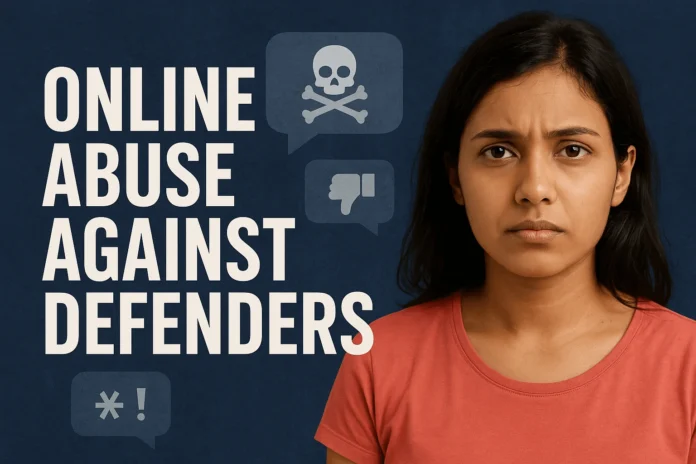Rising Online Abuse Against Defenders
A recent survey by Global Witness reveals a worrying rise in online abuse and harassment targeting defenders around the world—particularly those working on human rights, climate justice, and environmental protection.
Nearly one in four defenders reported being attacked because of their sex, while almost one in five said they were targeted due to their gender identity. These findings underscore the dangerous intersection of digital hate with systemic discrimination faced by women and marginalized groups.
From Indonesia to India, defenders are speaking out about the toll such harassment takes on their personal safety and credibility.
Fatrisia, a young activist from Indonesia, shared her ordeal:
“Unidentified attackers took photos from my personal Instagram and posted them on Facebook groups with thousands of followers. The posts were filled with hate speech and lies, including rumors that I was having an affair with a fellow activist. In Indonesia, for an unmarried woman, such allegations can destroy your credibility and reputation.”
The Connection Between Online and Offline Threats
The survey also highlights how digital harassment often escalates into real-world danger.
- 35% of respondents reported receiving threats of criminalization, including threats of arrest.
- 30% said they had already been criminalized for their activism.
Sharanya, a defender from India, described how online defamation spills into offline violence:
“Attackers use online platforms to shame and defame us, but then they escalate it offline by threatening us, putting us under surveillance, even throwing stones at our houses. It’s an attempt to silence us.”
This reinforces a growing concern that digital abuse is not isolated, but part of a broader strategy to intimidate and weaken defenders.
Social Media’s Role in Amplifying Abuse
Almost two-thirds of defenders surveyed believe the design and policies of digital platforms make harassment worse.
Key issues they identified include:
- Algorithms that fuel polarisation.
- Weak content moderation systems.
- Failure to act against bots and trolls.
- Monetisation incentives that reward harmful engagement.
These concerns are particularly directed at major platforms such as Meta (Facebook, Instagram) and X (formerly Twitter), which have scaled back certain safety mechanisms in recent years under the banner of “free speech.”
Global Witness warns that this rollback is silencing vulnerable voices, especially those defending land, communities, and the environment.
The Climate Crisis and Defender Safety
The dangers defenders face are mirrored in the experiences of scientists. According to a 2023 Global Witness poll of 468 climate scientists
- 39% of them had been the victim of internet harassment at work.
- This figure rose to 49% among senior scientists.
Ava Lee, campaign strategy lead at Global Witness, stated:
“The climate crisis is already putting enormous strain on those on the front lines. Social media companies are worsening the situation by allowing harassment to push people out of this essential movement. But it doesn’t have to be this way. With better investment in safety, moderation, and community protections, platforms can help build the trust and unity needed to confront the climate emergency.”
Platform Responses
Major platforms were asked to comment on Global Witness’s findings:
- Meta referred researchers to its Safety Center, highlighting tools like “hidden words” filters and “limits” to manage harassment.
- TikTok pointed to its community guidelines, which explicitly prohibit bullying and degrading behavior.
- Google and X declined to comment.
Global Context and Upcoming Report
The survey’s release comes ahead of the Global Witness Annual Defenders Report 2025, which will present data on killings and disappearances of land and environmental defenders worldwide during 2024.
Last year’s report revealed that at least 196 defenders were killed in 2023 for protecting their communities, natural resources, or environment—showing how life-threatening this struggle has become.
Conclusion
The evidence is clear: defenders are increasingly vulnerable to harassment and violence, both online and offline. As Global Witness stresses, the responsibility lies not only with governments but also with social media companies, whose platforms are shaping the way threats spread.
Without stronger protections, voices critical to defending human rights, justice, and the environment risk being silenced at a time when they are most needed.
Disclaimer: ✍️ Brendan Montague, an editorial team member at The Ecologist Online, authored this piece, which is informed by a press release from Global Witness.


